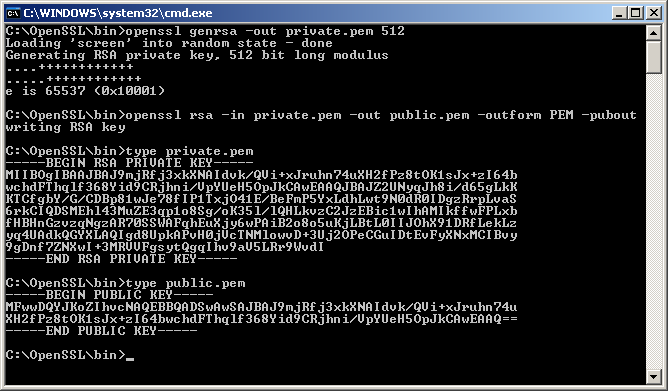Generate Public And Private Key Rsa Openssl
Generate private key and public key as buffers in hex (client) send the public key to the other endpoint safely (client) encrypt some data with a random 256 bit password using AES256 CBC (server) encrypt the password using the public key (server) send the encrypted data to the client (server). While Encrypting a File with a Password from the Command Line using OpenSSL is very useful in its own right, the real power of the OpenSSL library is its ability to support the use of public key cryptograph for encrypting or validating data in an unattended manner (where the password is not required to encrypt) is done with public keys.
Encrypt and decrypt files to public keys via the OpenSSL Command Line
Published: 25-10-2018 Author: Remy van Elst Text only version of this article
Table of Contents
This small tutorial will show you how to use the openssl command line to encryptand decrypt a file using a public key. We will first generate a random key,encrypt that random key against the public key of the other person and use thatrandom key to encrypt the actual file with using symmetric encryption.
Because of how the RSA algorithm works it is not possible to encrypt largefiles. If you create a key of n bits, then the file you want to encrypt mustnot larger than (n minus 11) bits. The most effective use of RSA crypto is toencrypt a random generated password, then encrypt the file with the passwordusing symmetric crypto. If the file is larger then the key size the encryptioncommand will fail:
We generate a random file and use that as the key to encrypt the large file withsymmetric crypto. That random file acts as the password so to say. We encryptthe large file with the small password file as password. Then we send theencrypted file and the encrypted key to the other party and then can decrypt thekey with their public key, the use that key to decrypt the large file.
The following commands are relevant when you work with RSA keys:
openssl genrsa: Generates an RSA private keys.openssl rsa: Manage RSA private keys (includes generating a public key from it).openssl rsautl: Encrypt and decrypt files with RSA keys.

The key is just a string of random bytes. We use a base64 encoded string of 128bytes, which is 175 characters. Since 175 characters is 1400 bits, even a smallRSA key will be able to encrypt it.
Get the public key
Let the other party send you a certificate or their public key. If they send toa certificate you can extract the public key using this command:
Generate the random password file
Use the following command to generate the random key:

Do this every time you encrypt a file. The settlers 7 cd key generator. Use a new key every time!
Update 25-10-2018
The key format is HEX because the base64 format adds newlines. The -passargument later on only takes the first line of the file, so the full key is notused. (Thanks Ken Larson for pointing this to me)
Encrypt the file with the random key
Use the following command to encrypt the large file with the random key:
The file size doesn't grows that much:
It's encrypted however:
Encrypt the random key with the public keyfile
Use the following command to encrypt the random keyfile with the other personspublic key:
You can safely send the key.bin.enc and the largefile.pdf.enc to the otherparty.
You might want to sign the two files with your public key as well.
Decrypt the random key with our private key file
If you want to decrypt a file encrypted with this setup, use the followingcommand with your privte key (beloning to the pubkey the random key was cryptedto) to decrypt the random key:
This will result in the decrypted random key we encrypted the file in.
Decrypt the large file with the random key
Once you have the random key, you can decrypt the encrypted file with thedecrypted key:
This will result in the decrypted large file. Avira antivirus key generator free download.
Tags: ca, certificate, decrypt, encrypt, openssl, pki, ssl, tls, tutorialsGenerating 1024 bit DKIM key
Openssl Rsa Public Key
To generate a DKIM key with openssl, do the following - this will generate you a 1024 bit DKIM key:
Your generated public key will remind something like below:
If you need to supply the public.key in the DNS record as follows, you have to 'convert' it manually to be in one line, i.e.:
Generate Public And Private Key Rsa Openssl Access
In bind/named compatible format, it will look like below TXT record:
Generating 2048 bit DKIM key
Please note that you may want to use a 2048 bit DKIM key - in this case, use the following openssl commands:
However, 2048 bit public DKIM key is too long to fit into one single TXT record - which can be up to 255 characters. Assuming your full public key is as follows:
..you need to split the text field into parts having 255 characters or less:
There are several limitations to 2048 bit DKIM records:
- While bind/named supports TXT fields being split into several parts, some DNS hostings may still not support it.
- If the total size of the DNS record is larger than 512 bytes, it will be sent over TCP, not UDP. Some buggy firewalls may not permit DNS packets over TCP.